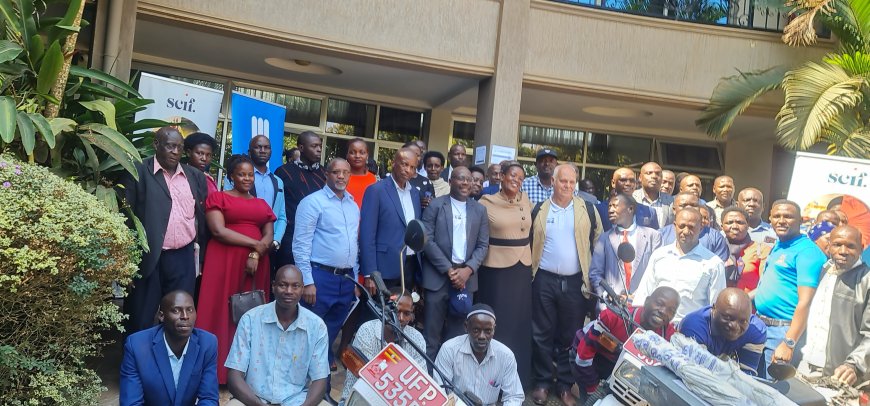Livelihoods uplifted as Sustainable Climate Impact Fund enhances access to safe water & environment protection.

The Sustainable Climate Impact Fund (SCIF), a pioneering social enterprise showcases its vital work to improve health, wellbeing and socio-economic opportunities of communities affected by climate change in Kalungu, Lyantonde and Kabarole districts.
SCIF officials stress the importance of addressing the climate-health nexus during a high-level seminar in Masaka.
The Sustainable Climate Impact Fund (SCIF) is a pioneering social enterprise aiming to improve the health and wellbeing of communities affected by climate change and create socio-economic opportunities, especially for women.
SCIF refurbishes water points that have been non-functional due to disrepair, and currently harbour several health risks to surrounding communities. All installed boreholes are accompanied by community hygiene education programmes implemented by WaterAid Uganda, and environmental conservation messages. Furthermore, SCIF is committed to the long-term viability of the water points by developing local capacity for maintenance, generating new jobs for borehole mechanics, with a special focus on female mechanics and providing external support when needed.
SCIF also works with communities in rural areas to protect the natural environment. By providing easy access to clean water, trees no longer need to be cut for firewood to boil water. Reducing deforestation means trees continue to absorb and store carbon dioxide, globally deforestation contributes to around 10% of global warming. Protecting the natural environment, for example by reducing deforestation through the provision of safe water has wide-ranging positive impacts on human and planetary health.
SCIF is a subsidiary of the renowned global health institution, the London School of Hygiene & Tropical Medicine (LSHTM), the parent organisation of The Medical Research
Council/Uganda Virus Research Institute.
The Unit Representative, Monica Badaru stated:“Today we are thrilled to take our partnership with the Sustainable Climate Impact Fund and communities in Lyantonde and Kalungu to the next level. We are eager to learn about the progress made by the SCIF’s safe water project, in contributing to increased access to safe water for communities in Kalungu and Lyantonde districts, and contributing to global efforts to slow down climate change.”
John Sarmer, Estates Director of the London School of Hygiene & Tropical Medicine stated: “Climate change poses a global challenge that requires immediate action. We are committed to implementing more climate friendly projects in Uganda. We want to continue working hand in hand with communities and government institutions toward healthier, more resilient communities and protecting our natural environment and resources.”
The Operations Director of SCIF, Ola Bankole said: “We are delighted that our SCIF Safe Water project is changing people’s lives for the better. We know from health centerscentres that cases of waterborne diseases have reduced where SCIF has refurbished boreholes, we know women have been able to grow their businesses because they spend less time fetching water and children no longer miss out on school because safe water points have been installed close to home. Through SCIF some of the aims of sustainable development are being realised.”
The Sustainable Climate Impact Fund (SCIF) collaborates with communities in Uganda, with a specific focus on regions vulnerable to the adverse effects of climate change. As a subsidiary of the globally renowned London School of Hygiene & Tropical Medicine (LSHTM), SCIF is committed to reducing, mitigating, and avoiding the environmental, social, and economic impacts of climate change on communities. SCIF’s projects are designed to promote community health, socio-economic development, and environmental sustainability, earning certification through the rigorous Gold Standard process and methodology which ensures carbon credits can be generated for offsetting of carbon emissions.












